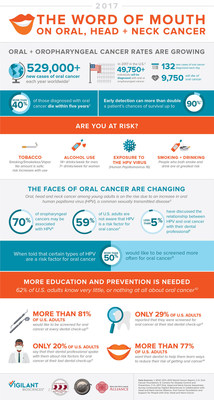TMCnet News
Oral Cancer Awareness Survey Reveals 81 Percent of U.S. Adults Want to Be Screened for Oral Cancer During Routine Dental Check-ups; Only 29 Percent Actually AreFORT LAUDERDALE, Fla., March 30, 2017 /PRNewswire/ -- According to a national survey released today, the majority (62 percent) of adults in the U.S. know very little, or nothing at all, about oral cancer (including cancer of the oral cavity, tongue, larynx and pharynx), and only 29 percent report being screened for oral cancer at their last dental checkup. The survey was conducted by Vigilant Biosciences, Inc., a leading innovator and developer of solutions that aid in the early detection and intervention of cancer, in collaboration with the Head and Neck Cancer Alliance, Oral Cancer Foundation and Support for People with Oral and Head and Neck Cancer (SPOHNC).
The online survey polled over 500 U.S. adults, ages 18-75, on their knowledge and perceptions of oral cancer and oral cancer screening. The findings were released today in support of Oral Cancer Awareness Month, which occurs in April, and Oral, Head and Neck Cancer Awareness Week®, which occurs April 2 – 9 this year. The survey found that more than 77 percent of U.S. adults want to learn more about how to reduce their risk for oral cancer, and are interested in simple screening tools that test for early indicators of oral cancer. The survey also revealed how little U.S. adults know about the various risk factors for oral cancer, particularly the connection between oral cancer and oral human papillomavirus (HPV), a common sexually transmitted disease. While the CDC reports that up to 70 percent of oropharyngeal cancers may be associated with HPV, the survey found that 59 percent of adults are not aware that HPV is a risk factor for oral cancer. Key findings of the survey are below. An executive summary of the survey and an infographic can be found at vigilantbiosciences.com. Screening for Oral, Head and Neck Cancer While less than a third of those surveyed recall being screened for oral cancer at their last dental check-up, a large majority would like to be screened at every check-up. Among notable findings:
Risk Factors: The Faces of Oral, Head and Neck Cancer Are Changing Tobacco use and alcohol consumption are behaviors associated with the highest risk for developing oral cancer. While the majority of survey respondents recognized tobacco use as a leading risk factor for oral cancer, many were not aware of additional risk factors, such as certain types of the HPV virus.
"Oral, head and neck cancer – particularly HPV-related – is increasing at an alarming rate and. Given that the symptoms are hard to identify, many people are not diagnosed until the cancer has progressed to a late stage," said Holly Boykin, Executive Director at Head and Neck Cancer Alliance. "Early detection is critical and may impact the complexity of the treatment of these cancers. By working together with other advocacy organizations and the medical and dental community, we can help save lives through early detection and a commitment to raising awareness about these cancers." "As an oral cancer survivor and advocate for 18 years, I see that the biggest challenge today is increasing public and professional awareness and involvement. We need to educate both on the risk factors they can avoid, recognition of early signs and symptoms, and the importance of annual screenings," said Brian Hill, Founder and Executive Director, Oral Cancer Foundation. "Early diagnosis will reduce treatment related morbidity and potential increase survivability when disease is found at earlier stages. Reducing the death rate from this disease is tangible, palpable, and doable in the immediate future." "A diagnosis of head and neck cancer can be overwhelming to the patient and their loved ones, and as the survey revealed most of these patients are looking for a network of support and resources," said Mary Ann Caputo, Executive Director of Support for People with Oral and Head and Neck Cancer. "Patients diagnosed with this disease can find support, hope and encouragement through SPOHNC's many resources and programs specifically designed for this patient population. SPOHNC's long history of more than 25 years understands the importance of the value of its programs and resources to this patient population. Any steps to raise awareness of oral, head and neck cancer will help to increase the survival rate and quality of life from earlier intervention." "Our survey this year found that there is still much work to be done around increasing awareness of oral cancer and oral cancer risk, particularly around the various risk factors for oral cancer," said Matthew H.J. Kim, Founder, Chairman, and CEO of Vigilant Biosciences. "Working together with medical and dental health professionals, as well as industry advocacy groups, we can reduce the number of late stage diagnoses by educating consumers at-risk and developing simple, accurate and cost-effective tools that can help detect oral cancer in its early stages, before it is too late." About Oral, Head and Neck Cancer Currently, the vast majority of patients are detected through a visual and physical exam when symptomatic and are likely late stage. As a result, oral cancer often goes undetected to the point of metastasizing. More than 40 percent of those diagnosed with oral cancer die within five years, due to late stage diagnosis. In contrast, early detection (stage I and II) of oral cancer yields survival rates of up to 90 percent. For those who survive oral cancer diagnosed in the later stages, the treatment is painful, debilitating and often disfiguring. In addition, patients often struggle with eating and drinking, communicating and self-image. About the Head and Neck Cancer Alliance (HNCA) About the Oral Cancer Foundation (OCF) About Support for People with Oral and Head and Neck Cancer (SPOHNC) About Vigilant Biosciences, Inc.
To view the original version on PR Newswire, visit:http://www.prnewswire.com/news-releases/oral-cancer-awareness-survey-reveals-81-percent-of-us-adults-want-to-be-screened-for-oral-cancer-during-routine-dental-check-ups-only-29-percent-actually-are-300431930.html SOURCE Vigilant Biosciences, Inc. 
|


